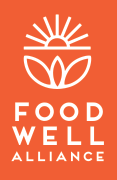Food Well Alliance awards 34 community garden leaders with tools to transform Atlanta neighborhoods
/Community gardens located in neighborhoods across our city transform the way we live, grow, and eat by building community and providing access to healthy, locally grown food. In some cases, they are the only source of fresh food for miles. These public garden sites are healthy civic spaces where children can learn and where neighbors can share knowledge and exchange ideas. By bringing people together, these gardens promote safety, health and vitality in our communities.
“One thing we often think about is how community gardens connect people to each other, and connect people to where their food comes from,” said Food Well Alliance Grants Coordinator Bobby Farmer.
Food Well Alliance is committed to supporting metro Atlanta’s community gardens so they can thrive and continue building healthier, more connected communities. After listening to garden leaders at our Community Garden Working Table, who shared their need for dedicated resources to sustain their gardens, we launched our first Community Garden Grant in 2015.
“These gardens and communities are really helping to craft the landscape of the city,” said Farmer. “They need our support to keep trying innovative approaches to maintain and expand their growing spaces, to have the tools necessary to make growing inclusive and accessible, and to continue engaging their communities around the garden.”
Since 2015, the grant has empowered gardens to create safe spaces, beautify neighborhood ecosystems, teach about healthy food, and increase community engagement. Most importantly, the grant has equipped gardens to grow and provide more local food in their neighborhoods. 2017’s grant recipients donated 16,720 pounds of fresh produce grown in their gardens.
We are pleased to award a total of $51,000 to support 34 community gardens through the 2018 Community Garden Grant. Our recipients represent diverse communities across five counties: Clayton, Cobb, DeKalb, Fulton and Gwinnett. Each garden will receive $1,500 to complete infrastructure or improvement projects on their gardens.
The recipients represent a wide variety of garden types--small neighborhood gardens, senior gardens, gardens that are community-led initiatives, gardens that are partnered with community-based nonprofit organizations, and gardens that are supported by local governments or public agencies.
Here are just a few of the needs that gardens will be able to fulfill through the grant:
- Beekeeping equipment for community use
- Community greenhouse improvements
- Organic compost and onsite compost infrastructure
- Infrastructure for community gathering spaces within the garden
- Elevated raised beds for disabled gardeners
- Storage sheds and communal garden tools
- Irrigation and rainwater catchment systems
- Senior/wheelchair accessibility
- Signage on seasonal planting, local ecology, and for community announcements
We recognize and applaud all of the gardens who applied, and we’re excited to announce this year’s recipients!
2018 Community Garden Grant Recipients
Austell Community Garden
Blooming with Possibilities Garden
Cabbagetown Community Garden
Campbellton Community Garden
Clarkston Community Garden
Clarkston International Garden
CNC Unity Garden
Collier Heights Park Garden
Community Garden@Snellville
Creation Care Garden
Cross Culture Community Garden
Elm Street Urban Farm
Five Points Farm
Flat Shoals Park Community Garden
Fruits of Your Labor Community Garden
Grape Roots
Historic Mableton Community Garden
J.R.'s Joy and Reflect Gardens
Jolly Avenue Community Garden
Lanier Community Garden
Lilburn Community Garden
Lovejoy Community Garden
Oak Hill Community Garden
Plant a Row for the Hungry
QLS Haven Senior community
Redan Community Garden
Rex Park Community Garden
South Fulton Community Garden
Springbrook Park Community Garden
St. Philip Benizi Garden of Hope
Sugar Creek Garden
The Garden of Plenty
Urban Fresh Community Garden
Villages at Carver



